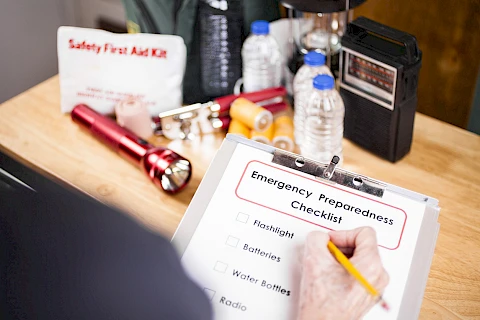
Fall is almost here, and cooler weather brings with it specific challenges. Preparing for emergencies is a critical step in ensuring safety and comfort during unpredictable weather. For seniors living in the Northeast, it's more vital than ever to have an emergency preparedness kit ready. We're here to help you create one.
Essential Items to Store
Now that you know how important it is to have an emergency kit, what do you put in it? The good news is that you likely have most items in your home, and it's not too expensive to fill in the gaps.
Non-Perishable Food
Keep a supply of shelf-stable food. Canned goods such as beans, soups, and vegetables are reliable options. Also, consider protein-rich foods like peanut butter, canned tuna, and granola bars. Aim to store at least a three-day supply for each person in your household. Choosing items with long shelf lives and ease of preparation can make a big difference during an emergency. Don't forget a non-electric can opener that's easy to use!
Water
Water is critical for survival. The American Red Cross recommends that you store at least one gallon of water per person per day for at least three days. This will cover your drinking and sanitation needs. Store water in a cool, dark place, and consider using sealed, food-grade water containers to keep it fresh and contaminant-free.
Flashlights and Batteries
Reliable lighting is incredibly essential during power outages. Flashlights are preferable to candles due to the fire risk that candles pose. Opt for LED flashlights as they last longer and are more energy-efficient. Make sure to have a stockpile of batteries that are compatible with your flashlights. Solar-powered or hand-crank flashlights can also be a great alternative since they don't rely on batteries.
Backup Medications
Always keep a backup supply of your essential medications. List all necessary medications and consult your healthcare provider to ensure you have an additional one-week supply. Store them in a waterproof container and check expiration dates regularly. Also, include items like a list of your medications, dosage information, and any necessary medical devices.
Additional Important Items
Your emergency kit should also include a well-stocked first aid kit to address minor injuries and prevent complications. Include adhesive bandages, antiseptic wipes, gauze pads, pain relievers, and any prescription medications. Don't forget items like tweezers, scissors, and a first aid manual.
Fall weather can be unpredictable and sometimes cold, so make sure your emergency kit includes warm clothing like sweaters, thermal socks, and hats. Add extra blankets or sleeping bags to keep warm during extended power outages.
Have important documents on hand. Include copies of identification like your driver's license and passport, medical records, insurance policies, and emergency contact information. Store these in a waterproof and fireproof container to protect them from damage.
Storing Your Emergency Kit
Store your kit in an easily accessible place, such as a hall closet or a spot near the main living area. Avoid basements or attics, as these can be difficult to reach during an emergency. Keep your kit organized and clearly labeled to make finding items easy under stress. Plastic containers are more pest-resistant than cardboard and should have well-fitting lids.
Regular Maintenance and Updates
Check and update your emergency kit regularly to ensure everything is in working order. Your goal is to review your kit every six months. Replace any expired items, restock used supplies, and make sure medications are up to date. Keeping an inventory list can help you track what's in the kit and what needs replacement.
Stay Safe With Senior Helpers
Having a fall emergency preparedness kit is a simple but crucial step in ensuring the safety and comfort of seniors during unpredictable weather. Start assembling your kit today to be ready for any situation.
Could you or a senior loved one benefit from in-home care and companionship? Senior Helpers Warren is here for residents of Erie, Bear Lake, Chandlers Valley, and Clarendon. Contact us today to learn more.